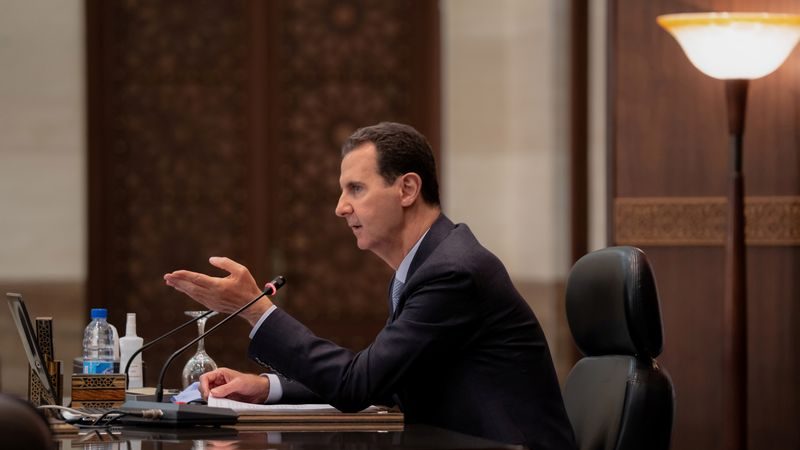Just hours after the decree by Syrian regime president Bashar al-Assad to tighten restrictions on freedom of speech and regime critics, the activist Bashar Barhoum—known for his critical and sarcastic videos about Syria’s domestic living standards—announced that he will completely end his activities on Facebook.
Barhoum explained his decision by saying that it responded to the president’s decision to increase restrictions. He argued that his words could be interpreted inaccurately. “My skin can no longer bear more violence,” Barhoum said, referring to the torture practiced by the security services inside their detention facilities.
Barhoum was keen to criticize the Assad regime’s government and try to hold it responsible for what Syrians are suffering inside the country, without addressing the regime’s president directly or holding him responsible.
Earlier, press reports had circulated announcing Barhoum’s arrest and guilt after he tried to address Bashar al-Assad in one of his videos. Barhoum eventually denied reports of his arrest on his Facebook profile.
On Monday, Bashar al-Assad issued an amendment to the penal code. The reforms included punishment for any Syrian who “broadcasts false or exaggerated news, which would undermine the state’s reputation or prestige, by imprisonment for at least six months,” reported the regime’s SANA news agency.
Read Also: Constitutional Talks: Gap Between Opposition and Regime Widens
According to the previous law, the sentence was only three months’ imprisonment. The same penalty applied to any Syrian who broadcast “news that would improve the image of a state hostile to Syria.”
The Assad regime provides classifications for all states opposed to it, or that have supported Syria’s opponents, labeling them as “hostile.”
One penalty that can apply to any person who raises criticism is: “Every Syrian who has authored written communication calling for reducing or ceding part of Syrian territory shall be punishable by at least one year’s imprisonment.”
Assad Fears Freedom of Speech
On Tuesday, several reports confirmed that the new amendments to the law came at a time when residents of regime-controlled areas are suffering from deteriorating living conditions. Most community members have been below the poverty line, leading to growing criticism of the regime—including hints at Assad himself.
Opposition voices have been emerging in areas considered loyal to the regime for years. In the center of Tartous, a former soldier wrote the words “Syria lived and Assad fell,” expressing his indignation. The soldier posted a video of himself in an incident that created a precedent in regime-controlled areas, reflecting an unprecedented state of audacity and indignation among Assad loyalists.
The incident was the first of its kind in which a Syrian publicized the rallying cry for toppling Assad. Central Tartous is known as the regime’s largest reservoir of support and a recruitment base of Assad’s militias.
Regime soldiers and pro-regime militias complain of what they call “government neglect.” According to these voices, the regime’s interest in its fighters ends as soon as that soldier is wounded in combat.
Escalating media criticism has led to the arrest of the regime’s most prominent loyalists, including the arrest of Reda al-Basha in August 2020. Basha was dismissed from the office of al-Mayadeen TV, based in Damascus, against the backdrop of criticizing the Assad regime’s government on social media. Earlier, even harsher punishment was carried out, namely the arrest of the director of the Damascus Now website, Wissam al-Tair. His fate remains unknown.
The regime’s preoccupation with media platforms is more evident in a bill on combating cybercrime. Aspects of the legislation have sparked widespread controversy among Syrian media users, who argue that the law further restricts freedoms. In particular, some articles of the legislation comprise ambiguous phrases and sentences, such as “undermining the state’s prestige” or “the public servant’s prestige.”
If enacted, the cybercrime law will increase penalties to up to 7 years, as well as impose large fines.
This article was translated and edited by The Syrian Observer. The Syrian Observer has not verified the content of this story. Responsibility for the information and views set out in this article lies entirely with the author.


